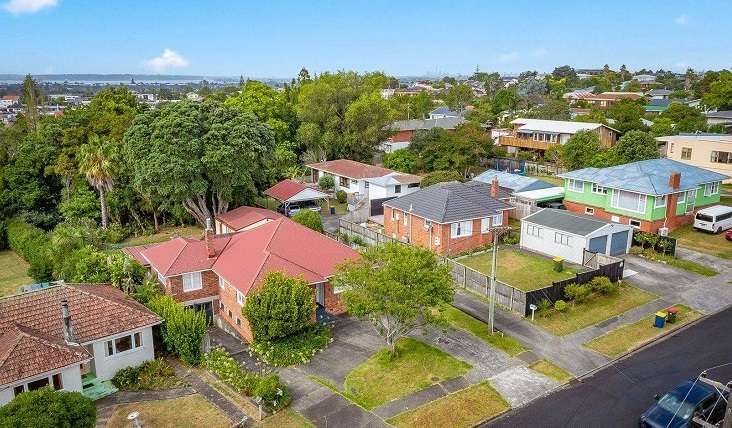Developers and investors who bought at the peak of last year’s market may now be struggling to settle their purchases, a real estate chief has warned.
Tom Rawson, who co-owns the Ray White franchise that covers much of South Auckland, told OneRoof that an email from a developer’s lawyer last month tipped him off.
“We had an email from a lawyer in early January saying his client, who was due to settle in the coming months, would be unlikely to settle,” Rawson said.
“They wanted to cancel the sale and purchase agreement to give the vendors a chance to re-sell now, not wait until their agreed settlement day.
Start your property search
Rawson began digging into other sales, and the news was not good. A number of developers and investors who had bought properties with long settlement periods - between six and 12 months - looked as if they would no longer be able to complete their deals.
“We looked into all our settlements, some of which stretch to November this year. We’ve already got a couple we know of now that could have difficulties and we’re picking up early signs a few more settlements might not go through.”
He said those at risk of defaulting had said changes to the lending rules had a negative impact on their financial position.

Real estate chief Tom Rawson says some developers and investors can't settle on properties they bought last year. Photo / Fiona Goodall
Rawson said one struggling buyer had even asked to for their deposit back (buyers forfeit their deposit if they fail to settle).
Rawson warned that one default could set off a chain of failed settlements.
“We’ve had a family who sold their house to a developer and bought on the basis of that sale who now can’t settle. They’ve paid their deposit [and now] they may lose that,” he said.
“In another case, there were four families in the chain – and they didn’t find out until the boxes were packed and the moving trucks were already there. That’s a gut-wrenching day.”
Rawson said that families who had sold their homes in September and October for a top price were now likely to re-sell for a lot less.
Those most at risk of defaulting were first-time large-scale developers.
“Many buyers were guys who’d done simple stuff before, putting a house on the back, that sort of thing. This was going to be their first big step up to multiple units. Now they’re struggling to secure finance, even with the increased demand for new builds.”
He said that bigger, more experienced developers were able to juggle a few properties to fund their settlements.
“They’ve got the skillset, the genuine intent to develop. They’re still transacting.”
Rawson reckoned the problem was not limited to his South Auckland patch.
“You’ll be seeing it from Ramarama to Remuera, when people who bought a year ago [come to settle]. I think it will be everywhere.”
Vendors having to re-sell their properties in February and March are unlikely to see the windfall prices they achieved when they sold between August and November last year.

Valocity head of valuations James Wilson says there is softer demand for properties with development potential. Photo / Fiona Goodall
James Wilson, head of valuations at OneRoof’s data partner, Valocity, said that the market was starting to soften.
“Properties with development potential, which were in extremely high demand in 2020 and 2021, have begun to experience a noted drop in demand,” Wilson said.
“The cost to realise the value potential of the sites continues to grow so we are beginning to see signs of value softening,” he said.
Harcourts agent Aman Gulia, who has made headline sales of Auckland development sites over the past two years, said that the issue was not with genuine developers.
“We sold over $130 million worth of property in the last year and have yet to see a developer fail or not settle on the property. Maybe in the past there was one in a 100, but not anymore.
“This could be because we work closely with developers who genuinely develop, building anywhere from 50 to 300 houses a year, rather than speculators trying to make a quick dollar.
“A lot of one-off developers, speculators and traders were the ones turning up to auctions and bidding competitively with the intention of making a profit by on-selling. Deals falling over isn’t developers running away, it is the speculators who bought to sell, never intending to build.
“We’re getting five or six calls a week now from people wanting to on-sell – it used to be one or two – but we don’t normally accept them.”

A trio of properties on Savoy Road, in Glen Eden, Auckland, is back on the market with resource and building consents in place. Photo / Supplied
Gulia said experienced developers would on-sell a property with resource consents or building consents in place if they were in trouble.
“They’d break even rather than walk away from the 10% deposit they have paid, or worse,” he said. “They’re de-risking, perhaps they bought five properties, so will sell some and keep some.
“We believe that this year there will be developers looking to sell prior to settlement, but we are expecting and working hard to keep our 100% settlement record intact.”
There is still a market for such sales. A trio of properties on 2000sqm on Savoy Road, in Glen Eden, Auckland, that sold in July for $4m, is now back on the market with resource and building consents and engineering approval for 19 townhouses. It is now looking for $7m.
“The vendor is leaving finance in, and we have multiple people interested in it,” Gulia said.
He said that most developers would have borrowed from second-tier lenders, not banks, so they had not been caught in the tougher lending conditions since the CCCFA came into effect in December.
Mortgage broker Rupert Gough said that it was too early to say if defaults were affecting customers who had signed up to buy a turn-key home in a development.
Even if the settlement time had passed “the odds are good the bank will honour that”.
“But if settlement is more than 12 months away, the bank often won’t give them the paper, or say it has expired and they won’t renew.”

REA chief Belinda Moffatt said the authority was aware of building supply issues. Photo / Supplied
Gough said that so far he had not seen buyers missing out because other sales further down the chain had failed to settle. “That is coming, but we haven’t seen it yet. The end of February, which is the end of the three-month pre-approval under the new [CCCFA] rules, is the critical time.
“The real pain for that will be having to go back looking with a lower number. If people were approved for a $1m loan, they’re now looking at $800,000.”
Belinda Moffatt, chief executive of the Real Estate Authority, said the authority had not seen any increase in complaints over failed settlements, but it was aware of the building supply issues affecting developments and that extended settlement times may increase the risk of defaults.
She added that a sale and purchase agreement would include specific provisions for what will happen if either party is unwilling or unable to meet their obligations to settle.
“Further clauses or amendments to the agreement can be made at the outset to provide protection from the risks of non-settlement, which should be considered when taking legal advice and negotiating the details of the contract before signing.”


















































































